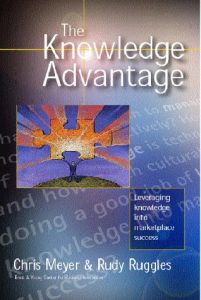Join getAbstract to access the summary!

Join getAbstract to access the summary!
Dan Holtshouse and Rudy Ruggles
The Knowledge Advantage
14 Visionaries Define Marketplace Success in the New Economy
Capstone, 2001
What's inside?
Knowledge management is not just technology — it’s complex, messy and critical to your future.
Recommendation
Editors Dan Holtshouse and Rudy Ruggles bring together 14 experts on knowledge management, including Peter Drucker, Alan Webber of Fast Company magazine and Stephen Denning of The World Bank. The best thing - and worst thing - about this compendium is that it is an anthology. Positively, it serves the unique purpose of offering an introduction to different views. If something piques your interest, you can investigate it further. But, unfortunately, you may be disappointed by a problem endemic to anthologies: lack of in-depth analysis. The book’s four sections focus on the role of knowledge individually and strategically (in two theoretical chapters) and on knowledge’s role on an organizational and economic level (in two more practical discussions). This is not a "how to" book about leveraging intellectual capital. Instead, getAbstract recommends it as a brief history of the evolution of knowledge in the context of the working world.
Summary
About the Authors
Rudy Ruggles and Dan Holtshouse edited and wrote the first chapter of The Knowledge Advantage. Ruggles works at the Ernst & Young Center for Business Innovation and is the author of Knowledge Management Tools. Holtshouse is director of corporate strategy knowledge initiatives at Xerox Corporation.
















Comment on this summary